From August 31 to September 8, 2022, a seven-member delegation of the Church in China partook in the 11th Assembly of the World Council of Churches (WCC), which was held in Karlsruhe, Germany. Led by President of CCC Rev. Wu Wei, the delegation consisted of Rev. Kan Baoping, vice chairperson of National TSPM, Rev. Shen Xuebin, vice president of CCC, Rev. Lin Manhong, associate general secretary of CCC and academic dean of Nanjing Union Theological Seminary (NJUTS), Rev. Wen Ge, interim chief of NJUTS’s Academic Affairs Office, Ms. Gu Jingqin, interim director of CCC&TSPM’s Overseas Relations Department, and Ms. Shi Meiying, secretary of the Overseas Relations Department.
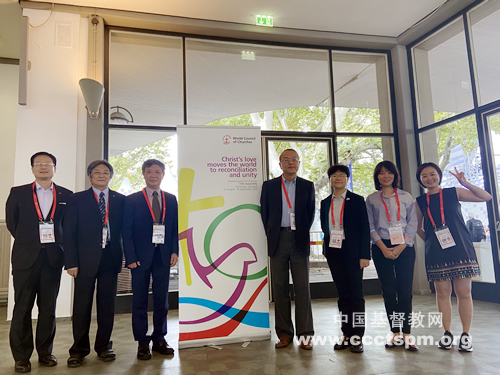
The World Council of Churches was founded and convened its first assembly in 1948 in Amsterdam. The WCC assembly is held every seven or eight years, while the 11th Assembly had to be postponed for a year due to the COVID-19 outbreak. The WCC has 352 member churches from over 120 countries and regions, representing more than 580 million Christians worldwide.
In 1991, China Christian Council became a full member of the WCC and a delegation under the leadership of Bishop K.H. Ting attended the Assembly that year. Ever since then, China Christian Council has sent delegations to join each assembly of the WCC. Delegates of China have been elected as members of the Central Committee and the Executive Committee for quite a number of times.
The 11th Assembly, under the theme of “Christ’s love moves the world to reconciliation and unity”, gathered over 4,000 participants, including more than 700 delegates, more than 100 staff from WCC, more than 180 students and teachers of GETI, more than 150 young volunteers worldwide, and many staff from the German churches and organization responsible for the preparation of this assembly.
The nine-day assembly followed a regular schedule. After the morning prayer, there were a 90-minute thematic plenary for 5 days, based upon the assembly spirit of “reconciliation and unity”. The first thematic plenary was under the theme of “The purpose of God’s love in Christ for the whole creation – reconciliation and unity.” The second thematic plenary revolved around the topics on Europe, stressing that the church should learn from the parable of “the Good Samaritan” in the Bible so as to address the challenges posed by wars and serve those inflicted by wars. The third and the fourth thematic plenaries were under the themes of “Affirming the wholeness of life” and “Affirming justice and human dignity”. The former mentioned that Christians should be like our merciful Lord Jesus to help the people being mistreated with injustice, while the latter told Christians to transform evil with the love of Christ and achieve unity, in front of systematic evil existing in the world. “The bond of Christian unity and the churches’ common witness” was the theme of the last thematic plenary. It pointed out that Christians should accept each other and strengthen the bond in order to address a multitude of challenges together. In His love and His calling, Christians have the mission to make a difference and promote world peace through koinonia, testimonies, services and so forth.
The business plenaries were convened between 15:00 to 16:30. During the business plenaries, the assembly elected new regional presidents and new central committee (including the moderator and vice moderators) as well as executive committee; it deliberated basic committee reports on the WCC’s finance, public affairs, regulations and policies, as well as program planning; and passed the unity statement as well as other documents.
In addition to the plenaries, there were also a wide range of activities. Every noon at 12:00, a 75-minute home group was held and each group had around 20 members from different churches. Group members from all parts of the world shared their ideas and thinking of the contents of the morning prayer and thematic plenary, and had discussions around the theme of the assembly in the contexts of their own churches.
In the afternoons, attendees could joined the 75-minute-long ecumenical conversations after the business plenaries. Delegates could select and enroll among all 23 thematic conversations according to their theological interests and ministries. The subjects of these mini theology seminars included from the church’s perspective how to help the marginalized, how to spread the gospel and social justice, church disability ministry, the essence and mission of the church, theological education, Christian ethics and human rights, climate change and water resource issues, interfaith peace, church services in response to the challenges posed by the pandemic, racial discrimination, etc.
There were also confessional meetings (Lutherans, Reformed Christians, Anglicans, of the Uniting and the United Church, etc.) and a regional meeting (i.e. Asia, Europe, North America, Middle East, etc.) held on two evenings. Other sessions run by member churches and organizations like workshops, exhibitions and the Ecumenical Institute Bossey’s alumni gathering, made it possible for the assembly to facilitate exchanges and unity among churches in a diverse manner. This fully reflected the bridging role of the WCC assembly as a platform of global dialogues and interactions.
The assembly was also an assembly of worships and prayers. Every day started with a morning prayer and there were also evening prayers. The worship committee was in charge of the daily devotional that took on various forms in worship and hymn singing. The traditional Orthodox worship seemed more solemn; the African church praised the Lord in dance and music; the Latin American church sang with a great passion. In prayers and worships all Christians became one with God.

During the 11th Assembly, the Chinese delegation took an active part in sorts of activities, fully demonstrating the booming and healthy development of Chinese churches.
On the evening of September 1st, Rev. Lin Manhong and Rev. Wen Ge participated in the WCC’s “Unity and the uniting churches” meeting. They briefly introduced the situation of the Church in China, and the unity and growth of the Church in China.
On the evening of September 2, Rev. Wu Wei and other delegates attended the Asian regional meeting. Rev. Wen Ge delivered a greeting. He mentioned the long history of ecumenical spirit in Asia and took the unity of churches in South India in the 1940s as a good example. Being in the unique multi-religious cultural and social environment, Asian churches that featured a large population of Christians should endeavor to construct their own contextual theology for guiding church growth and unity, as well as jointly addressing poverty, ecological problems and so forth, said Rev. Wen. Rev. Lin Manhong made a closing prayer at the end of the meeting. She prayed for Asia, for the church unity, and for the love of Christ spreading to those afflicted by wars and natural disasters.

Rev. Wen Ge was invited to attend the business committee meeting held every morning. As the leadership of the WCC assembly, the committee is made up of over 20 people, including general secretary, WCC presidents, vice presidents, moderators, etc. He also worked as the rapporteur for the sixth ecumenical conversation – “Expand the dialogue on church”. The session focused on the contemplation on the essence and mission of the church, based upon the ecumenical significance of response given by the WCC’s Faith and Order Commission through an important consensus document called The Church: Towards a Common Vision. The consensuses reached by attendees included the concerns over the fast-growing and populous churches in Asia, Africa and lain America, young people’s recognition of the church, relations between eucharist and baptism, etc.
Ms. Gu Jingqin was invited to read the Scripture in Chinese at the morning prayer. On the evening of September 6, Ms. Gu took part in the essay collection launch for the International Missionary Council Centenary Conference. She shared the impacts of the conference on the Church in China and threw some insights on the future cooperation and interaction between Chinese churches and overseas churches.
On the afternoon of September 7, from 5pm to 6:15pm, there was a themed workshop with a title of “A Journey Towards Unity in a Chinese Context”. The workshop was hosted by Rev. She Xuebin, vice president of CCC. Four speakers, namely Rev. Wen Ge, Rev. Lin Manhong, Mr. Liu Siyuan from the Amity Foundation’s Africa office, and Rev. Kan Baoping, in turns made four presentation on the theology of unity, education and practice, social service and the unity of China. Through the presentations, a more clearer picture of Chinese churches’ understanding on unity as well as the outcomes were elaborated, and the principle of One China was as well reiterated.
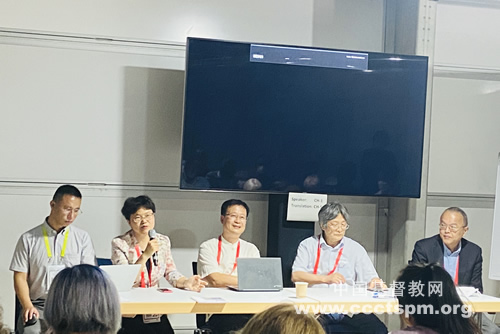
Listeners showed great interest in the Chinese churches’ ongoing practices of Chinanization of the Christian Church in China that was mentioned by all four speakers. A few questions were posed by the audience. They cared about how CCC&TSPM proceeded the Chinanization on the premise of respecting and accepting culture and characteristics of the ethnic minorities, whether the theological education left room for cultural diversity, how to embrace and manifest the uniqueness of ethnic minorities and their cultures. They wanted to know the main content and basic features of the unity with Chinese characteristics, as well as any interreligious dialogues in church social services in China, etc. The responses by the speakers helped attendees clear up the misunderstandings and deepen their understanding of the unity and church ministries in China.
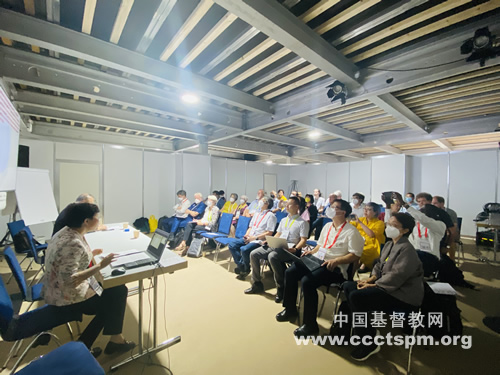
The representative of the Reformed Church in Zimbabwe spoke highly of China’s proactive efforts in having dialogues and communications with overseas churches, and expected Chinese churches to continue and further push forward the work.
On September 6, Ms. Gu Jingqin, and Rev. Lin Manhong were elected onto the Central Committee of the WCC. Also on September 8, Rev. Lin Manhong, like three other committee members, was again elected as one of the 25 members of the Executive Committee.
During this assembly, the Church in China renewed old friendships and made new friends as well. The Chinese delegates had exchanges with the representatives of a number of international and regional organizations as well as churches from Germany, Netherlands, UK, Canada, US, Zimbabwe, Bangladesh, Myanmar, Pakistan, Brazil, etc. They shared the situations of churches in the post-coronavirus world, and paved the way for the resumption of in-person visits in the future.
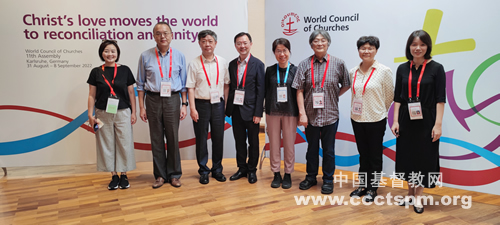
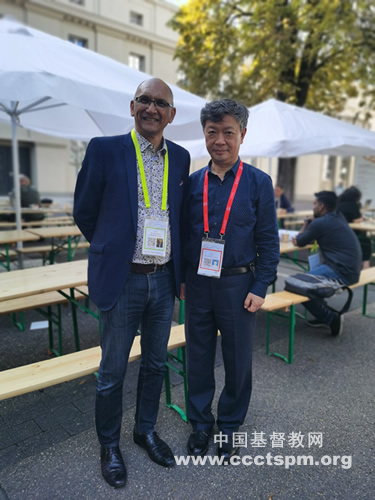
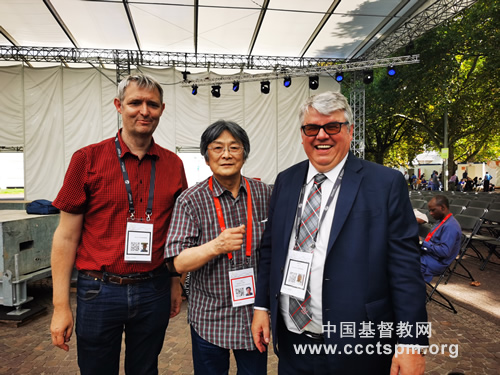
On September 1st, Rev. Wu Wei, Rev. Kan Baoping and Rev. Shen Xuebin, together with two staff of the Overseas Relations Department had dinner with colleagues of the EKD and the EMW in Germany. The two sides had an amicable conversation.
On September 5, Rev. Wu Wei and Ms. Shi Meiying were invited to lunch with Rev. Olav Tveit, presiding bishop of the Church of Norway and former general secretary of WCC. Rev. Tveit expressed the willingness of continuing mutual visits between the churches in two countries. He also cared about the efforts made by the Church in China in amidst of Covid in terms of pastoral ministry as well as social services.

On September 7, Rev. Wu Wei had a conversation with the Archbishop of Canterbury and Mrs. Welby. Rev. Shen Xuebin and Ms. Gu Jingqin also attended the meeting. The two sides were willing to strengthen the interaction and open up more dialogues.
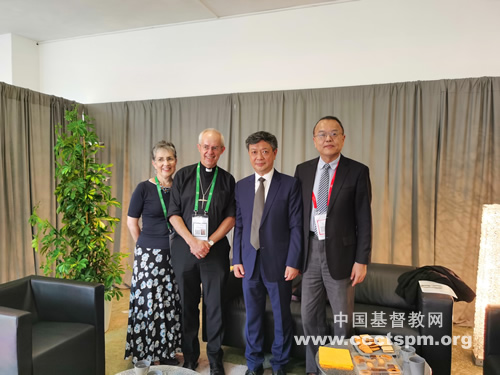
After the assembly, the delegation had a stay in Frankfurt. They had zoom meetings with local Christians as well as in-person meetings with ecumenical officers of the region. The delegates met up with the directors and staff from Hessen Church’s Ecumenical Relations Office, the China Zentrum, EMW and Mission One World, etc.
The delegation visited local social service projects to further understand German churches’ involvement in humanity work, and exchanged ideas with members of these churches and organizations concerning church contextualization, religious dialogue and so forth.
This journey to Germany has been CCC&TSPM’s first foreign visit since the COVID-19 outbreak. The visitation is of vital importance in filling the gap caused by the delayed face-to-face communications in the last two years, and enhancing mutual understanding and mutual trust with ecumenical churches.
Translated and edited by Bei Feng.